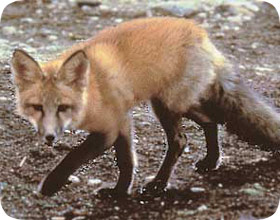-
info@aaanimalcontrol.com
Call us for help in your town
Humane Wildlife Education
Do foxes make good pets?
Need fox removal in your hometown? We service over 500 USA locations! Click here to hire us in your town and check prices - updated for year 2020.
The straight answer is no. There are ads who claim that they are domesticated and sure, they can be domesticated! But doesn't mean that it will be easy or fun. The only time you'd find them fun and enjoyable is when they are young or kits. However, once they start to grow up, your problems will slowly start. This is because as soon as they reach their sexual maturity, their whole behavior changes. They become disobedient and will no longer listen to your commands. Not to mention, your house is no longer safe! They easily get bored and will resort to chewing at your furniture while you are away.
But if you are still undettered and you are so hard-pressed into getting a fox of your own, here are a few things you have to know:
What are foxes really like?
As was mentioned already, foxes aren't the most easiest to train. They have a will of their own and because of this you will find out that they are incredibly hard-headed and disobedient. To top it all off, they easily get bored and will most likely chew away at your furniture.
Are they similar to dogs?
Absolutely not! Despite many claims of foxes being domesticated, they aren't like dogs who have been domeseticated for centuries! Unlike dogs, foxes do not follow commands and are still wild animals no matter other people's claims.
Will they get along with other pets (cats, birds, etc?)
Again, the answer is no. Foxes are after all, still predators and wild animals so their instincts will tell them to hunt and kill. Other pets especially small ones like rodents and birds are definitely not safe with foxes.
Can they be trained?
Sure, they can. But it really is more about putting in the effort and time to train them well because as we already know, they can be notoriously disobedient. It is very important to remember that foxes aren't like dogs who are willing to be trained and want to please their masters that is why it might be very difficult to train foxes if you aren't willing to put the time and effort into doing so.
What do they prefer to eat?
They like eating small livestock and pets like:
• Rabbits
• Guinea pigs
• Chicken
They will also eat some fruits but you shouldn't be too worried about them going through your vegetable garden.
Do they still hunt?
Yes, they still have those insticts and so they will hunt if they want to.
So, there are many difficulties when trying to train and keep foxes as pets. It's not impossible, but it will be harder. If you want to get an easy pet to train and have, you should just get a dog instead.
Fox are mostly harmless, but sometimes it's necessary to remove foxes from an urban or rural area because the animal is causing real problems. Some people just
have a fear of foxes, as if they're dangerous predators, but they're not. The truth is that foxes will pretty much never attack pets, and never people.
Still, they can cause some problems. They do prey on people's chicken coops, for example. Foxes have become common urban or suburb animals in many areas, and can dig through garbage, eat pet food, dig in the yard, and potentially
live under a house or shed or porch, and spread fleas. It's not unusual for fox to set up a den underneath a porch.



















